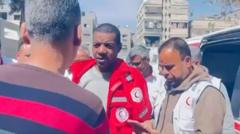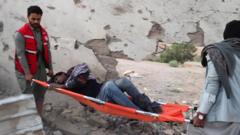In a recent development amid the ongoing violence in Gaza, the Palestinian Red Crescent Society reported the release of paramedic Assad al-Nassasra, who had been detained following a deadly Israeli military attack that killed multiple medical workers.
**Gaza Medic Released After Month-Long Detention Amid Ongoing Conflict**

**Gaza Medic Released After Month-Long Detention Amid Ongoing Conflict**
After 37 days in Israeli detention, Palestinian paramedic Assad al-Nassasra is welcomed back by colleagues from the Red Crescent as tensions in Gaza escalate.
The Palestinian Red Crescent Society (PRCS) indicated that Assad al-Nassasra was released after a prolonged detention of 37 days, during which he had been missing for three weeks. His disappearance came after an Israeli airstrike that tragically claimed the lives of 15 emergency responders in southern Gaza last month. This incident drew significant scrutiny and criticism, particularly after the International Committee of the Red Cross confirmed his detention status.
Reports suggest that al-Nassasra was among at least ten detainees freed at an Israeli border crossing on Tuesday. However, the Israeli military has yet to provide detailed comments regarding al-Nassasra's case, only having acknowledged his detention during a briefing about an internal inquiry that highlighted various “professional failures” surrounding the attack on the medical workers.
The incident occurred on March 23 when Israeli forces opened fire on ambulances and emergency response vehicles responding to a call in the Tal al-Sultan area of Rafah. Among the casualties were eight PRCS paramedics, six Civil Defense officials, and an employee from the UN agency for Palestinian refugees (UNRWA). Their remains were discovered buried in shallow graves a week following the incident, exacerbating the tragedy of the event.
While the Israeli military initially cited operational misjudgments, stating that some vehicles were traveling suspiciously through darkness, it later recognized the errors in that narrative, especially after video evidence surfaced illustrating that the ambulances were utilizing emergency lights. This contradicted their prior account and fueled accusations of negligence.
In an inquiry report, Israeli officials noted that errors led to the tragic killings but failed to address the critics' claims of systemic issues regarding the targeting of medical missions. The PRCS condemned the findings, asserting they serve as a façade to shield the accountability for what they describe as a "war crime" against medical teams—specifically those operating under the Geneva Conventions.
As the ongoing conflict continues to devastate Gaza, the humanitarian toll escalates. Figures from Gaza's Hamas-run health ministry cite at least 52,365 deaths since hostilities reignited following a ceasefire collapse in mid-March. Despite repeated calls for humanitarian access, Israel has fortified blockades, significantly impacting essential aid deliveries and resulting in dire shortages of food and medicine.
The UN's human rights chief has urged immediate action to prevent deeper humanitarian crises, noting that starvation as a weapon of war is categorically a war crime. Meanwhile, responses to the conflict remain polarized, with Israel insisting that it complies with international law in its actions.
The ongoing violence further complicates the notion of accountability, raising urgent questions about the protection of civilians and the alarming consequences of sustained military actions.

















